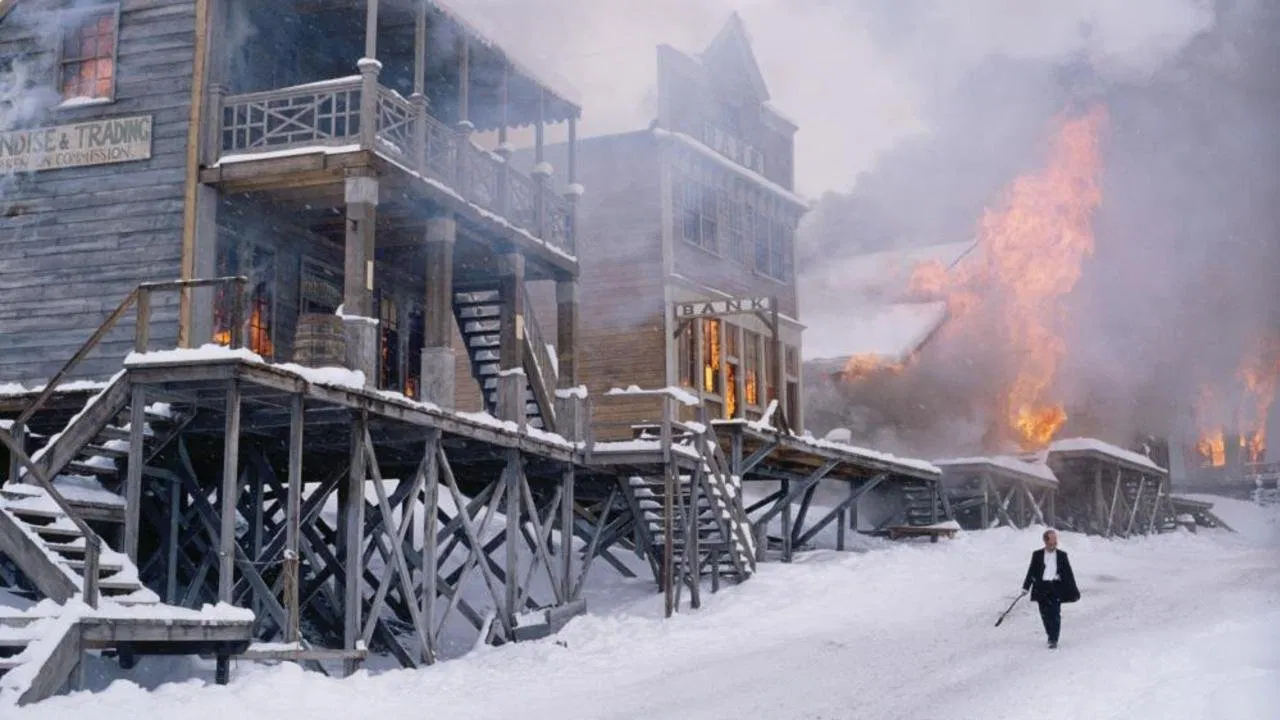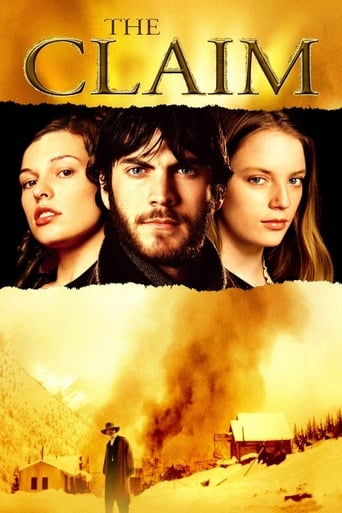

A very good film, one that is not easy to get into initially but is very rewarding once you stick with it. The Claim does take its time to set up and is a little pedestrian in doing so for my tastes, and will test the patience of others(looking at previous comments The Claim seems to have divisive opinions and understandably). Wes Bentley and Sarah Polley's characters are also not very well developed, not helped by a subplot that is unmoving and under-baked and a rather detached performance from Bentley. What is especially good about The Claim is how it looks, it is filmed absolutely beautifully and the scenery and wintery wastelands are both stunning and brooding. Michael Nyman's music is tense and hypnotic, though one asset that not everyone will have the same opinion about because people will argue that it's repetitive as well. I can understand, the chord structure and progressions are relatively so but the atmosphere it has and the orchestration are done really well. The songs are lovely, and sung as effectively sung and placed. The Claim is a very intelligently written film, one of Michael Winterbottom's strong points has been that even when a story is loose or not as linear as one expects(nothing wrong with that, there are a lot of great films that are somewhat unconventional) the script always comes alive in how thoughtful and intelligent it is, and that is the same with his direction as well. The story once it gets going is fascinating with mostly engaging subplots and well-fleshed-out characters(especially Mullen's Dillon), it is slow and deliberate but it is a film that is very rich on atmosphere. Also The Claim is based on The Mayor of Casterbridge, Thomas Hardy's writing is vivid stuff and the storytelling is also paced deliberately, The Claim makes an effort to stick to the spirit of that story and also to match its pace but admittedly more slowed down to allow the atmosphere to come through. And come through it does making the film really elegiac and haunting in tone, the moving scenes like the ending are really emotionally powerful. The Claim may not be your traditional Western, rich in atmosphere but not so much on action. But from what action there is, it is well staged and not that confusing. Peter Mullen is mesmerising giving his conflicted character a lot of meat and brooding intensity. Milla Jovovich has a beguiling presence, Sarah Polley while not having a well-developed character is still very able(much more so than Bentley) and Nastassja Kinski is very touching in a smaller role. In conclusion, The Claim is beautiful to watch, intelligent and brilliantly atmospheric, one of those films that proves that ambitious does work. 8/10 Bethany Cox
... View More***Spoiler alert of a difficult scene involving horses*** Although overall a beautifully filmed movie with a great story, there is one scene that I'll never be able to get out of my head, that of the exploding chemical detonation materials wagon used by the surveyors of the railroad. It was not so much the presumed facsimile (were they?) animal parts lying in the snow near the burning, blown up wagon, but the haunting image (for what seemed an eternity) of the surviving horse dashing full speed away from the remains with it's body mostly on fire. I kept waiting for relief, for the fire to be quenched, but alas, this horse never did "drop and roll", and the scene is cut without resolution. As the movie was filmed on location in both Canada and the United States (Colorado), I waited expectantly to see the AHA credit (or Canadian equivalent) roll at the end to assure that indeed, no animals were harmed in the making of this film. There was no AHA credit or any other disclaimer. I searched online to see if anything had been written about this scene, and whatever happened to that horse, but have been unable to find any additional information. I want to believe that it was special effects, that the horse was not harmed. But it looked too real, and I'm sure that was the desired effect, to reflect what historically happened to working horses of that era.Please, if anyone has any other information to share about this particular scene, kindly post it. I don't want to discredit this otherwise engaging movie just because of this scene, if its animal actors were truly protected during filming.Thank you.
... View MoreIn 1840's Missouri, the launching pad for manifest destiny, they used to say about people preparing to go West when it was most of it unsettled wilderness, that they were "jumping off". The film is about several such people who have made the jump from faraway homes, some are Irish come West with the famine, others Polish-born or from Lisbon."Jumping off", the phrase connotes the vastness of no man's land, a kind of cosmic gap.Ford's western wrote the legend, but left out those gaps of muddled life, which had to wait until around the time of Altman's McCabe & Mrs. Miller. The filmmaker shoots in this mode, so muddled life, drifting gaze, lingering shots of ordinary nothing. Vast mountain nature.But he also wants this to be an elegy to the passing of the West in that reflective vein of recent westerns, and some questionable acting, soporific drama and overly-emotive Nyman score, negate the unobtrusive lightness of just life. So this was probably ruined on a technical level, but there is something to recommend it.One of those who jumped off is a man, who in a log cabin one night with snow-blizzards raging outside, bartered everything he would need to be whole as an old man for what he would eventually have too much of to have any use for. He has built a town with his gold, but that night of years ago which has left a gap in him comes back one day.The notion is that you wake up one day and life has gone, and so long as it settles on this in a visual way, the film has spark. There is a great shot worthy of Herzog, where he has a two-story frame house hauled by horses across the snow, a home for his loved one— this is how deeply he regrets that night.This will be later mirrored in the whole town relocating to where the new railroad is going to pass through—which leaves him stubbornly alone in his empty town. This is followed by a great finale of madness and ruin.But there is too much doodling in the snow with second-rate romance and elegy, it never takes off from the edge. It's ultimately a letdown, which is a shame, because when you go through it all, there is a great film somewhere in there.
... View MoreIt's the Old West in Canada. A young man (Peter Mullan) trades his wife (Nastasja Kinski) and baby (later to turn into Sarah Polley) for a gold mine and years later becomes the benign dictator of the town of Kingdom Come. He builds a splendid home, along the lines of a slapdash version of Mad King Ludwig's.The railroad plans to pass by, but not through Kingdom Come. Along with the rush of people, there is Kinski, now terminally ill, and Polley, who does not know that Mullan is her father. Kinski asks for help and Mullan remarries her in what seems to be an attempt to undo the immoral act he earlier committed. Not that he's in any big hurry to get rid of his monumental stash of stone-heavy gold bars in the locked shed next to his house.Milla Jovovich is present as one of the more prominent whores in the flourishing cat house.You know -- whatever else this movie has or does not have -- it must be said that this is a talented line up of gorgeous babes. Kinski, Polley, and Jovovich. Murderer's Row of pulchritude. And Kinski, though now old enough to play a the mother of a grown woman, is stunning. Age cannot wither nor custom stale her. They all turn in professional performances too.It's all pretty tragic however. It's clear that Mullan is ridden with guilt and love but Kinski's destiny is fulfilled, so he's missed out on the most fruitful time they might have spent together. He's compelled to tell Polley that he's her real father and she stalks off into the snow without a word.Then there's that pesky railroad. Since it will run through the plain below, it leaves Mullan and his mountain empire high and dry. Everyone leaves Kingdom Come to establish the new railroad town down there -- somewhere.It's all too much for Mullan. He burns down the town he built and consigns himself to a snowy death.It's a very deliberately paced and realistic-looking Western. The clothes are suitably heavy and drab. The mountains are majestic and snow-veined but as cold and forbidding in their own quiet way as the people who populate the town. There is laughter and booze, but it all seems forced. Nobody's love is fully expressed. There's no operatic content.There's a little gun play too, but this is a Canadian movie and Canadian movies are always thoughtful, slow, a little dark, and lacking in scenes in which someone's head explodes or an arm is wrenched off or an eye gouged out. I can't even think of a Canadian film in which someone visits a dentist.I admire it for its location shooting and for the performances, however reined in they are by the script and direction. Ultimately it's a gloomy story. No one enjoys seeing someone utterly demolished in spirit on the screen, not even a miscreant like Mullan. At least he was capable of remorse.
... View More